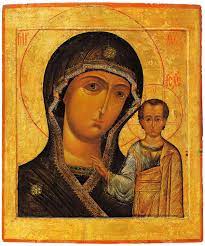Eps 12: The Virgin Mary: Theotokos
— The Moments About the Virgin Mary in the Role as the Mother of God
In a 10-minute podcast titled "The Virgin Mary: Theotokos," the speaker explores the significance of the Virgin Mary's title as Theotokos, which means "God-bearer" or "Mother of God" in Greek. The speaker delves into the historical context of the title's emergence and its theological implications within Christianity. The podcast begins by explaining that the title Theotokos emerged during the third and fourth centuries in response to certain theological debates surrounding the nature of Christ. One key point of contention was whether Mary gave birth to only Jesus' human nature or his entire person, including his divine nature. The title Theotokos emerged as a way to affirm that Mary indeed bore and mothered the whole person of Jesus, both human and divine. The speaker highlights the role of the Council of Ephesus, which was held in 431 AD and officially endorsed the title Theotokos. This council solidified the theological understanding that Mary, as the mother of Jesus Christ, was the bearer of God Himself. The speaker emphasizes that this title was not meant to elevate Mary above God, but rather to emphasize the profound union of humanity and divinity achieved through the Incarnation. Moreover, the podcast explores the significance of Theotokos in terms of Mary's role in the salvation narrative. By accepting this title, Mary becomes intimately involved in God's plan of redemption, playing a crucial role in bringing salvation to humanity through her obedience and willingness to bear the Son of God. The speaker concludes by addressing the controversy that still surrounds the title Theotokos, with some Christian denominations expressing concerns about potential misunderstandings and fearing it may lead to exalting Mary to a divine status. However, the key point stressed in the podcast is that the title is primarily an affirmation of the Incarnation's significance and the unique role Mary played in it. Overall, the podcast sheds light on the historical context and theological implications of the title Theotokos. It explores how this term emerged in response to theological controversies and expresses the intimate connection between Mary and the divine, emphasizing the crucial role she played in the salvation narrative.
| Seed data: | Link 1 |
|---|---|
| Host image: | StyleGAN neural net |
| Content creation: | GPT-3.5, |
Host

Jane Nelson
Podcast Content
The theological understanding of Mary as Theotokos can be traced back to the early centuries of Christianity and formalized in the Council of Ephesus in 431 CE. At the council, the title was established to affirm the belief that Jesus was both fully human and fully divine, with Mary as the vehicle through which God became incarnate. Theotokos encapsulates the belief that in giving birth to Jesus, Mary gave birth to the Son of God. It is a title that exalts Mary's unique role in salvation history, emphasizing her divine maternity and elevating her to the highest esteem among saints and intercessors.
Throughout the Bible, Mary is portrayed as a young woman of great faith, humility, and obedience. From the Annunciation, where the Angel Gabriel revealed to her the divine plan for her life, to her presence at the crucifixion of Jesus, Mary's character shines as one marked by unwavering devotion and submission to God's will. In scripture, she is often depicted as a figure who pondered and treasured the words of God in her heart. Her yes to God's call serves as a model for believers, showing the importance of surrendering to God's plans and trusting in His faithfulness.
The veneration of Mary as Theotokos has flourished throughout the centuries, with various devotional practices and cultural expressions. In art, Mary is frequently depicted with her Son, adorned with heavenly garments, and surrounded by angels and saints. The rosary, a beloved prayer practice, centers on reflecting on significant moments in the life of Jesus through the eyes of Mary. Pilgrimages to Marian shrines, such as Lourdes or Fatima, continue to draw millions of believers seeking solace, healing, and spiritual guidance from the Mother of God. Mary's intercession is sought by many, believing that her closeness to Jesus gives her a unique connection to the divine, allowing her to bring prayers and petitions before God.
Beyond her historical significance, Theotokos continues to hold relevance today. In a world rife with suffering, Mary stands as a symbol of hope and compassion. Her maternal care extends to all humanity, and her unwavering presence offers solace to the broken-hearted, comfort to the weary, and guidance to those seeking a deeper relationship with God. Theotokos invites believers to seek Mary's intercession, trusting in her willingness to bring their concerns before her Son and dedicating themselves to imitating her faith and surrender to God's will.
However, it is important to note that the veneration of Mary as Theotokos is not without controversy. Some Christian denominations have expressed concerns about what they perceive as excessive attention given to Mary, arguing that it may distract from the centrality of Jesus Christ. It is crucial to engage in respectful dialogue and understanding across different theological perspectives, seeking to find common ground in the shared belief in the person and redemptive work of Jesus Christ while appreciating the unique role of Mary as Theotokos.
In conclusion, Theotokos remains a central theme in Christian theology and devotion. Mary's role as the God-bearer highlights her indispensable role in salvation history and assures believers of her loving care and intercession. Her humility, faith, and obedience serve as an inspiration to followers of Jesus, reminding them of the importance of surrendering to God's plans. While controversies may arise around her veneration, it is crucial to engage in respectful dialogue, recognizing the diverse ways in which Christians honor and revere the mother of Jesus. Theotokos invites believers to deepen their understanding of Mary's significance and consider her continued relevance in their own spiritual journeys.
